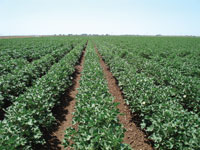
 Taking Pride in Texas Cotton
Taking Pride in Texas Cotton
Story and Photo by Hilari Vargas
The Texas Plains is the most concentrated cotton producing area in the United States, accounting for 40 percent of the United States’ total cotton crop. Cotton is the largest cash crop in Texas and there are no other alternatives that compete economically. To maintain this economic importance requires hard work as well as knowing what is coming in the future. To accomplish this, the Fiber and Biopolymer Research Institute in conjunction with the Lubbock Cotton Exchange have hosted the Texas International Cotton School, since 1989.
Dean Ethridge, Ph.D., is the managing director of the Texas Tech University Fiber and Biopolymer Research Institute.
“If the Texas Plains were a separate country, it would be the largest cotton producing region in the world,” said Ethridge.
The program was created to promote Texas cotton and to give students and professionals the opportunity to learn from top cotton experts during an intensive two-week program.
Ethridge stated, “When people speak of the U.S. cotton industry internationally, their reference is the Texas industry. The school raises the profile of the Texas cotton industry and is a vehicle for cotton grown here on the Texas Plains.”
In addition to learning experts’ practices, participants gain hands-on experience in all areas of the industry. People from all over the world that are involved in the cotton industry come to Lubbock, once a year to attend this school. At the school, students learn about marketing, future markets in the 21st century, cotton production and harvesting, cotton fiber, and global issues. Some of the classes include breeding strategies, contaminants, marketing, fiber properties and measurements, environmental issues, and cotton insurance.
Graduate students have the option of attending the school for credit toward their graduate degree. In two weeks, students obtain as much information as they would in a normal semester. At the end of the course they are required to write a term paper on a more in depth study of a selected aspect of the global cotton industry.
Will Keeling, who is working on obtaining his masters in agricultural economics, attended the 2011 session. Keeling’s family farms cotton around Ropesville, Texas. He enrolled in the course to learn more about the global cotton supply field.
“My background is in cotton production. However, the Texas International Cotton School gave me a better understanding of the marketing and textile aspects of the cotton industry,” Keeling said. “I enjoyed learning about the importance of the different quality attributes of cotton and how they translate into textile processing."
Graduate students majoring in Plant and Soil Science, Agricultural Economics and Agricultural Business have been a few of those who have attended the school for credit. Katie Meeks has been the coordinator for the Texas International Cotton School for the past three years.
“What is unique about the Texas International Cotton School is that it incorporates graduate students and professionals learning together,” Meeks said. “There are not a lot of programs that allow you to do that as a graduate student.”
The 2011 Texas International Cotton School was held from August 8th through the 19th and had 32 attendees. Some of the countries represented at this years’ school were Columbia, Argentina, Mexico, Turkey and India. Texas Tech had 12 graduate students who participated. The school has 30 speakers from around the U.S. who travel to Lubbock to teach and present at each session.
This unique program allows professionals to evaluate information in a manner which enhances their ability to turn these concepts into a focusedunderstanding of the global cotton industry.The dates for this year’s Texas International Cotton School are August 6 through the 17. More information about the school and information on applying can be found at www.texasintlcottonschool.com, or by calling (806)742-2838.